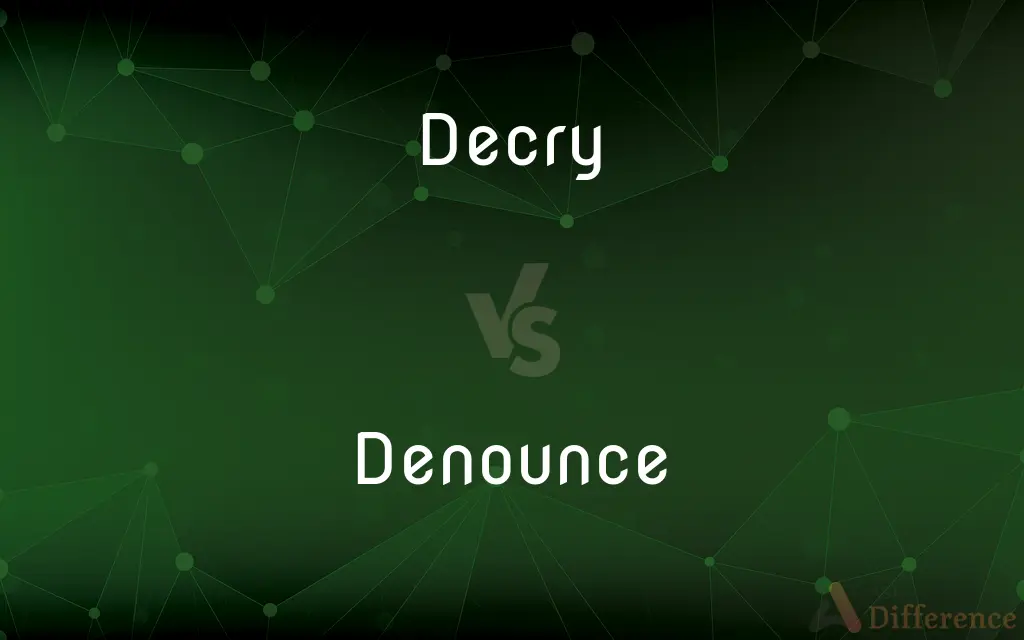Decry vs. Denounce — What's the Difference?
By Urooj Arif & Maham Liaqat — Updated on April 8, 2024
Decry implies expressing strong disapproval, while denounce involves publicly condemning or informing against.

Difference Between Decry and Denounce
Table of Contents
ADVERTISEMENT
Key Differences
Decrying is the act of publicly expressing disapproval or criticism of something, highlighting its flaws or negative aspects. This term often suggests a moral or aesthetic judgment. On the other hand, denouncing goes a step further by not only criticizing but also condemning something or someone, often in a formal or official context. Denouncing can also imply accusing someone of wrongdoing or declaring something to be wrong or evil.
While decrying can be seen as a form of protest or disapproval, denouncing carries a stronger connotation of public shaming or informing against someone. For example, one might decry the state of public education, focusing on its shortcomings, whereas denouncing a public official involves a formal accusation of misconduct.
Decrying tends to focus on the expression of disapproval itself, without necessarily calling for action. In contrast, denouncing often implies a call to action or a demand for change, as it usually targets specific individuals, organizations, or practices deemed harmful or unethical.
The context in which these terms are used can also differ. Decrying is often associated with broader social or cultural issues, whereas denouncing is more commonly used in political, legal, or ethical contexts, where there is a clear perpetrator or an issue of moral or legal wrongdoing.
Understanding the nuances between decrying and denouncing is crucial in discussions about social, political, and ethical issues. While both involve expressions of disapproval, the intensity and implications of each action differ significantly.
ADVERTISEMENT
Comparison Chart
Definition
To express strong disapproval.
To publicly condemn or accuse.
Implication
Criticism or disapproval.
Public shaming or accusation.
Context
Broad issues, moral or aesthetic judgments.
Specific wrongdoings, political or ethical issues.
Connotation
Expresses disapproval without necessarily calling for action.
Stronger, often includes a call to action or demand for change.
Focus
The act of disapproving itself.
Targeting specific individuals or practices for condemnation.
Compare with Definitions
Decry
The act of criticizing something to highlight its faults.
He decried the lack of creativity in modern cinema.
Denounce
Expressing strong disapproval in a public way.
They denounced the company's environmental policies.
Decry
Expression of dissatisfaction with a particular situation.
She decried the state of the city's parks in her blog.
Denounce
To make a formal accusation against.
The senator was denounced for accepting bribes.
Decry
Making a formal statement against something.
The organization decried the government's decision.
Denounce
To inform against someone formally or officially.
She was denounced to the authorities by a colleague.
Decry
To publicly denounce or express strong disapproval of something.
Activists decried the new policy as unjust.
Denounce
Announcing something as harmful or deserving punishment.
The act was denounced as a betrayal of trust.
Decry
To speak out against something in a disapproving manner.
He decried the commercialization of the holiday.
Denounce
To publicly condemn someone or something as wrong or evil.
The minister denounced the violence at the rally.
Decry
To express disapproval of (a person); denounce
"I could not bear to hear my old nurse so decried" (Charles Dickens).
Denounce
To condemn openly as being wrong or reprehensible.
Decry
To depreciate (currency, for example) by official proclamation or by rumor.
Denounce
To inform against (someone); accuse publicly.
Decry
(transitive) To denounce as harmful.
Denounce
To give formal announcement of the ending of (a treaty).
Decry
(transitive) To blame for ills.
Denounce
To make known in a formal manner; to proclaim; to announce; to declare.
Decry
To cry down; to censure as faulty, mean, or worthless; to clamor against; to blame clamorously; to discredit; to disparage.
For small errors they whole plays decry.
Measures which are extolled by one half of the kingdom are naturally decried by the other.
Denounce
(transitive) To criticize or speak out against (someone or something); to point out as deserving of reprehension, etc.; to openly accuse or condemn in a threatening manner; to invoke censure upon; to stigmatize; to blame.
To denounce someone as a swindler, or as a coward
Decry
Express strong disapproval of;
We condemn the racism in South Africa
These ideas were reprobated
Denounce
(transitive) To make a formal or public accusation against; to inform against; to accuse.
To denounce a confederate in crime
To denounce someone to the authorities
Denounce
To proclaim in a threatening manner; to threaten by some outward sign or expression; make a menace of.
To denounce war; to denounce punishment
Denounce
(transitive) To announce the termination of; especially a treaty or armistice.
Denounce
To claim the right of working a mine that is abandoned or insufficiently worked.
Denounce
To make known in a solemn or official manner; to declare; to proclaim (especially an evil).
Denouncing wrath to come.
I denounce unto you this day, that ye shall surely perish.
Denounce
To proclaim in a threatening manner; to threaten by some outward sign or expression.
His look denounced desperate.
Denounce
To point out as deserving of reprehension or punishment, etc.; to accuse in a threatening manner; to invoke censure upon; to stigmatize.
Denounced for a heretic.
To denounce the immoralities of Julius Cæsar.
Denounce
Speak out against;
He denounced the Nazis
Denounce
To accuse or condemn or openly or formally or brand as disgraceful;
He denounced the government action
She was stigmatized by society because she had a child out of wedlock
Denounce
Announce the termination of, as of treaties
Denounce
Give away information about somebody;
He told on his classmate who had cheated on the exam
Common Curiosities
Can you decry without denouncing?
Yes, you can decry something by expressing disapproval without necessarily condemning it or calling for punitive action.
Is denouncing stronger than decrying?
Yes, denouncing is generally considered stronger than decrying because it not only involves criticism but also a public condemnation or formal accusation.
Why is denouncing considered a serious action?
Denouncing is considered serious because it not only implicates wrongdoing but also often involves a call for accountability, potentially leading to legal or social consequences.
What is the impact of decrying on social issues?
Decrying can bring attention to social issues and generate public discourse, potentially leading to calls for action or change.
Is it necessary to denounce wrongdoing?
While not always necessary, denouncing wrongdoing can be important for ethical accountability and justice, especially in cases of serious ethical or legal violations.
Can an action be both decried and denounced?
Yes, an action can be both decried and denounced, especially if it is widely viewed as harmful or unethical, attracting both general disapproval and formal condemnation.
What does it mean to denounce someone?
To denounce someone means to publicly condemn them or inform against them, often in a formal or official context.
How do media outlets use decry and denounce?
Media outlets may use "decry" to report on expressions of disapproval or criticism, and "denounce" to report on formal condemnations or accusations against individuals or entities.
Can a government decry policies of another country?
Yes, governments often decry policies or actions of other countries as a way of expressing disapproval without taking formal action.
What does it mean to decry something?
Decrying something means publicly expressing strong disapproval or criticism of it.
What role do public figures play in decrying or denouncing issues?
Public figures can amplify issues by decrying or denouncing them, drawing public attention and potentially influencing policy or social change.
How can individuals effectively decry or denounce injustices?
Individuals can effectively decry or denounce injustices by using platforms to speak out, participating in activism, and supporting organizations that fight against those injustices.
What is the relationship between decrying and protesting?
Decrying can be a form of protesting, where expressing disapproval serves as a way to highlight issues and demand change.
Can decrying lead to change?
Yes, decrying can lead to change by raising awareness and mobilizing public opinion against certain practices or policies.
How does the legal system use the concept of denouncing?
The legal system uses denouncing to formally accuse individuals of crimes and to condemn actions that are against the law, signaling societal disapproval and the need for punishment.
Share Your Discovery

Previous Comparison
Wanker vs. Yanker
Next Comparison
Stake vs. GambleAuthor Spotlight
Written by
Urooj ArifUrooj is a skilled content writer at Ask Difference, known for her exceptional ability to simplify complex topics into engaging and informative content. With a passion for research and a flair for clear, concise writing, she consistently delivers articles that resonate with our diverse audience.
Co-written by
Maham Liaqat















































